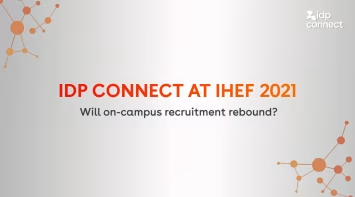A 2019/20 Year-on-Year analysis of student searches
As institutions scramble to stay on top of rapidly evolving policy changes and regulations, it’s especially vital for marketing departments to keep a close eye on what type of content prospective students are choosing to consume. These insights can guide institutions in what they should be sharing with their student audiences to stay relevant and to draw interest from prospects in an increasingly competitive playing field.
Year-on-year subject trends can also give institutions an indication of what students of tomorrow may be looking to study. This is not only important for marketing departments, but for institutions holistically in deciding which courses to focus on and promote.
In this article, we take a deep dive into various year-on-year trends across two of the UK’s most popular student sites: Whatuni.com (4,022,349 users, 2019) and the Complete University Guide (9,723,144 users, 2019). We also look at the effectiveness of video content and which call-to-action buttons are drawing most attention.
This analysis uses data from the date ranges 1/10/2018 to 30/09/2019 versus 1/10/2019 to 30/09/2020 for Whatuni and 1/05/2018 to 30/04/2019 versus 1/05/2018 to 30/04/2020 for CUG.
Most searched content
Looking at the top-most searched blog posts on Whatuni for 2020, the following themes earned the top three spots: (1) 8 Jobs you can do with a criminology degree, (2) Are BTEC’s as valuable as A-levels? and (3) What is an HND and an HNC?
Perhaps the rise of crime series on Netflix (and arguably more time spent on the sofa during lockdown) is piquing the interest of young people to find out more about what a career in criminology would look like. What is perhaps most notable is that students are increasingly interested in how their studies and the subjects they are passionate about will translate into employment and a career, possibly reflecting an awareness of a volatile graduate job market in the context of the pandemic.
The focus on employment is also reflected in the searches around BTEC's, HND's and HNC's which suggest that courses centred on careers and employable skills are a high priority for students.
One of the most searched blog posts on Whatuni for both 2019 and 2020 was: 21 Alternative Ways to Revise. Not only is the post informative, but it’s also broken down into easy-to-read bullet points with entertaining memes to keep a young audience engaged.
Interestingly the post, What you can do with a Biomedical Sciences degree, has been among the top 5 most searched posts over the last year. While this persistent popularity may be down to a variety of factors, including the government's recent focus on STEM subjects and the high demand in the jobs market for medical professionals, the NHS has particularly been in the spotlight this year with initiatives such as ‘clap for the NHS’, which raised the profile and popularity of professionals working in the national health service. Perhaps our trend shows that young people are more interested and feeling more inspired than before to pursue health-related careers. We also looked at searches by users between the ages of 35 and 65+ (Whatuni’s most likely parent audience) where the ‘Biomedical Sciences’ blog post also crept into the top 10 most searched content this year. This may point to what parents consider secure course options for their children.
Safeera Sarjoo, Whatuni Editor, says: "During COVID-19 we've been paying close attention to news surrounding exams, Clearing and university admissions. There has been a lot of uncertainty and this has informed how we have met student needs- by focusing on the issues that matter to them the most. By listening to conversations, we have been able to carve out a robust section on Whatuni addressing concerns, answering questions and giving students the reassurance they need right now."
Between March and September this year it comes as no surprise that following the criminology-themed post, students have been most interested in reading COVID-19-related content alongside the University Guides and Advice section. Whatuni’s parent audience has also been reading COVID-related content, with the post titled, University Applications 2020: COVID-19 Changes to Uni Entry, being among the top five most read content pieces. With all the uncertainty around students returning to campuses around the UK, it’s no wonder readers are seeking further guidance and turning to trusted resources.
On CUG, we see a significant 50% YoY increase in traffic to League tables, making up 36% of overall site pageviews for 2020. International content and preparing-to-go content both saw -47% and -25% decreases respectively. The referenced declines could be linked to more students studying remotely - thereby reducing the need to prepare for in-person study – and international COVID-related travel restrictions leading to less interest in international content. University rankings are seemingly more important than ever.
Joseph Wood, CUG Editor, says about adapting content during the pandemic: “It has been a challenge for the team. We’ve monitored trends and decided to publish additional pages about A-Level results, appeals, Clearing and other government measures affecting universities. We also included new content on what university life and teaching might look like when students returned in September. Our site pages still need constant monitoring and updating due to the constantly shifting landscape.”
The power of video content
A key question for institutions, considering marketing budgets and effort, has been whether and to what extent having video content improves student engagement. To guide the decision making of institutions, we undertook a comparison of the university profiles on Whatuni with and without video content.
Our analysis was based on a sample of three institutions on Whatuni with video content and three without video content. Then we looked to see how the conversion rates from profile pageviews converted through to clicks to the respective university websites. The profiles with video clearly showed higher click-through conversion rates. In fact, two of the profiles with video had conversion rates of 18% and 19%, while the highest conversion rate for the institutions with no video content was only 11%.
On a student website, such as Whatuni, with hundreds of thousands of visitors every month, this kind of percentage change can make a big difference. Looking at the average, profiles with video content had 16% conversion rates, while those without only had 10% conversion rates.
Year-on-year subject searches
Whatuni shows mostly consistent year-on-year subject trends with a few minor changes. Psychology remains the most searched subject over the last two years, followed by Life Sciences. In 2020, third place saw some movement with Semi-medical/ Physical/ Psycho/ Therapies overtaking Teaching/ Training, while Nursing also jumped up from 7th to 5th position. Interestingly, Medical Technology/ Pharmacology enters the top ten for the first time in 2020 not only taking 9th position in 2020 overall, but moving up further to 8th place between March and September 2020. Again, this trend could be a sign of the times, as young people are inspired by the NHS’s efforts in curbing COVID-19.



On CUG, Law was the most searched subject across the last two years with a 13% year-on-year increase. Business & Management Studies and Economics came in second and third positions across both years, followed by Computer Science and Medicine. While in 2020 Computer Science overtook Medicine, the latter still saw a 10% increase in interest.
Of all the top 10 most searched subjects , Computer Science saw the most significant increase in interest with a 17% rise. COVID-19 has sped up the digitalisation of the workplace, spurring lagging businesses into facilitating remote working and becoming more tech savvy. Perhaps this trend has highlighted the importance of technology, driving more interest to subjects such as Computer Science. Beyond that, the ongoing focus on STEM subjects at schools coupled with the rapid pace of digital developments has made computing and technology a prosperous and growing sector. Therefore, student interest in Computer Science can be considered a reflection of students' awareness of where the growth industries are and a commitment to developing the skills and qualifications required to enter a thriving sector.
Coming in 8th position, Biological Sciences saw a notable 10% year-on-year increase, reflecting the rise in interest for Biomedical-Science-related content as seen on Whatuni.

Call-to-action trends
Another key concern for institution is driving traffic to their websites and events. We therefore looked to see if there had been a shift over the last year in which call-to-action (CTA) buttons users were selecting. Whatuni’s five primary CTA buttons are: Web Click (through to a university website), Prospectus, Contact via Email (direct to university), Book Open Day and Call Hotline (specific to Clearing). The Web Click button (75.49% to 74.21%), Prospectus button (12.34% to 12.51%) and Call Hotline button (1.11% to 1.34%) saw minimal year-on-year changes, while the Book Open Day button decreased from 4.04% to 2.84% and the Contact via Email button increased from 6.90% to 9.08%.

This may be an indication that the rise of virtual open days over the last few months aren’t quite replacing the real deal and instead users are finding the information they need on university websites. This either presents an opportunity for institutions to improve their web content with media such as video or to ensure that virtual open days add extra value. The increase in users opting for Contact via Email may suggest that users are looking for more direct ways to connect in the absence of face-to-face interactions due to COVID-19. Universities will do well to add as many personalised interactions with prospective students as possible.
Adapting to the times
In an increasingly competitive playing field, it’s vital for institutions to adapt to how they engage with and support students. Institutions should share content that students want to consume across the most engaging mediums (e.g. video), they should update the formats of services such as Open Days and keep a close eye on how subject preferences are evolving. Those institutions most agile and adaptive are most likely to weather the challenges presented by COVID-19.
Find out more about our IQ services, which enable real-time demand analysis, informed trend predictions and far-sighted recruitment strategies to drive conversion and deliver effective ROI outcomes for HE institutions. More information here.
You might like...

Q&A with James Smurthwaite: Getting prospective students excited about studying abroad
In this series of interviews we get to know some of our IDP experts who often operate behind the scenes.

Q&A with Rachel MacSween, Director of Client Partnerships UK and Europe at IDP Connect
In our latest Q&A, Rachel talks all things HE and why the sector continues to inspire her

Counsellor Q&A: Thai perspectives on studying in the UK and attracting more Thai students to UK institutions
Specialist advice from our education counsellors for the Thai student market



